Jian Ghomeshi: How he got away with it
Jian Ghomeshi’s behaviour was an open secret, going back to his university days. Not that anyone took action. In fact, the CBC made him a star.
Jian Ghomeshi, a Canadian radio personality, and host of the radio show “Q,” in New York, June 18, 2012. Ghomeshi’s show, which can now be heard in the U.S., blends arts, culture and entertainment through long interviews, live music interludes and a daily monologue by the host. (Ari Mintz/The New York Times) — PHOTO MOVED IN ADVANCE AND NOT FOR USE – ONLINE OR IN PRINT – BEFORE JULY 22, 2012. —
Share
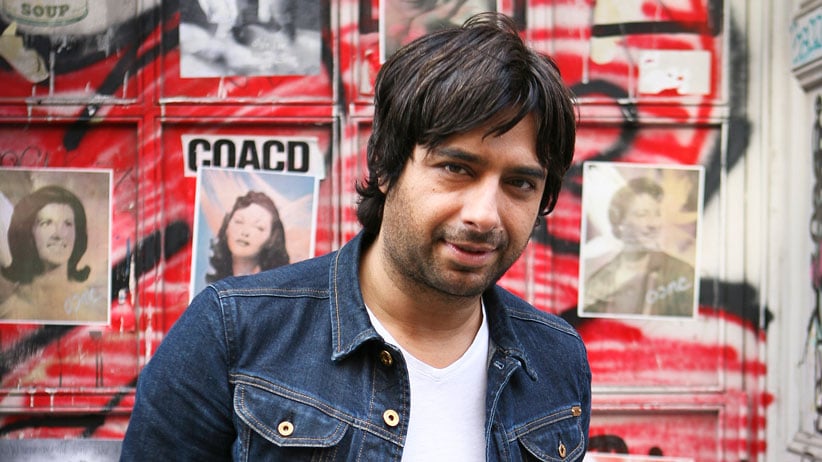
Update: On March 24, 2016, Jian Ghomeshi was found not guilty on four counts of sexual assault
At 9:05 a.m. on Thursday, Oct. 23, Jian Ghomeshi leaned into the microphone for what would be his last Q with Jian Ghomeshi, though neither the CBC radio host nor his loyal audience knew it. Sitting in the red-and-black, cave-like Q studio that had seen performances by Arcade Fire and visits from Margaret Atwood, Ghomeshi began as he always did: with the trademark cheesy pick-up line addressed to a nation: “Well, hi there,” he intoned in his velvet baritone. What followed was another Q signature: a short essay almost always penned by Q staff, but positioned as Ghomeshi’s thoughtful or impassioned or funny musings. A telling measure of Ghomeshi’s popularity—and the collective belief that the words are his own—is evident in the way Q’s tongue-in-cheek protest against Kraft Dinner removing the artificial dye that made its noodles neon-orange prompted Kraft to create and tweet a mocked-up KD package with Ghomeshi’s face and the message: “Well, hi there, Jian Ghomeshi, you smooth-talking, early-rising, exquisitely coiffed national treasure.”
The essay he read on Oct. 23 was more sombre, spoken against the elegiac strains of Moby. Passionately and reassuringly, Ghomeshi addressed a country in shock from shootings on Parliament Hill the day before: “This is not what we do, who we are,” he said. He referenced Canada as CBC listeners want to believe it—an open, progressive, inclusive “land of peace and order.” He warned of political finger-pointing: “We believe too strongly in this country, this culture, this collective.” He addressed Ottawa: “A nation is grateful. A nation is thinking of you. I’m Jian Ghomeshi. This is Q.”
Just five days later, his status as a man who could speak for Canada was shattered. A cryptic CBC memo announced Ghomeshi had been let go. Ghomeshi was quick to fill in the blanks, framing his termination as a high-minded fight over sexual “human rights,” as he put it in a Facebook post hours later. The letter, addressed to “my friends and family,” would inflame his progressive audience, despite the many telltale red flags—the retrograde “jilted girlfriend” trope, summoning Fatal Attraction and Gone Girl, the “freelance writer” with an axe to grind, and the claim that CBC had seen proof that all the sexual acts he was accused of were consensual, as if that were even possible. Ghomeshi, with the help of Navigator, a high-profile damage-control firm, invoked valued Canadian touchstones: He referenced the Charter of Rights and Freedoms, echoing Pierre Trudeau’s “the state has no place in the bedrooms of the nation.” What he called his BDSM sexual practices were likened to scenes in Lynn Coady’s Giller prize-winning book. The note concluded by coming full circle to the Ottawa shootings: “I have always tried to be a good soldier and do a good job for my country.” Within hours, the post had more than 102,000 “likes” and sparked ardent cries of support for the fallen radio host.
Within days, though, many of his staunchest defenders—among them Elizabeth May, Amanda Palmer and Judy Rebick—were asking themselves how they could have swallowed his version, hook, line and sinker. The warnings, beginning with the fact that we were only hearing one side of the story, were there for anyone who wanted to see. Within a week, nine women had come forward to accuse Ghomeshi of violence and sexual assault, two willing to be named. This week, Jim Hounslow, an employee at the Canadian Museum for Human Rights in Winnipeg, alleged Ghomeshi “grabbed my genitals and fondled them” when they were both students at York University in the 1990s. Toronto police launched an investigation, with three women, including actress Lucy DeCoutere (pictured left), coming forward to lay complaints, and the nation had been introduced to “Big Ears Teddy,” Winnie the Pooh’s dark doppelgänger.
By then, Canada’s most overt public shaming was in full swing. Its target: Ghomeshi, the unoffical ambassador of Canada’s “creative class,” a ubiquitous presence at galas, opening nights, concerts, screenings, awards ceremonies, panels, debates. Anger percolated over the seeming disconnect between the allegations and Ghomeshi’s public persona as an enlightened, sensitive progressive who called Jack Layton his “mentor,” who has interviewed political dissidents such as Ai Weiwei, and who tweets out support for white-ribbon campaigns. Ghomeshi had even been touted as a perfect Toronto mayoral candidate in 2012 by his friend Richard Florida, the social economist who coined the term “creative class.” “I would like to see a younger person and someone who is not the usual suspect; someone who looks and acts like Jian Ghomeshi,” Florida told Toronto Life.
As details of the allegations surfaced, a Jiandenfreude took grip: glee over the number of Facebook followers Ghomeshi was losing; Twitter shares of photographs of the scraping away of the 20-foot poster of the preternaturally youthful 47-year-old from CBC headquarters; and delight over news that yet another friend or associate had severed ties. Even his bandmates from Moxy Früvous—the group broke up almost 15 years ago— felt compelled to issue a group statement: “We are sickened and saddened by this week’s news. We had no inkling that Jian engaged in this type of behaviour.”
As those linked to Ghomeshi run for cover, the allegations provide a case study of systemic failure to address sexual assault and abuse, and they launched a full-on movement on social media.
But the soul-searching within the insular Canadian arts and cultural establishment had another component. Though the specific allegations themselves, and their horrifying nature, came as a shock to many, there had been foreshadowing for years in the circles in which Ghomeshi moved, a tribal drum dating back to his days at York University 25 years ago, warning women not to get too close. Yet, concurrently, Ghomeshi had carved out an ever-growing platform, aided by the CBC, his employer of 12 years. His public profile made him known, a familiar and seductive voice in the country’s ear.
In the circles that helped to propel Ghomeshi and kept him aloft, if there was a collective shock, it wasn’t based on the Jian we didn’t know, the Mr. Hyde we never saw. It was based on the Jian many had known for decades—the Jian hiding in plain sight.
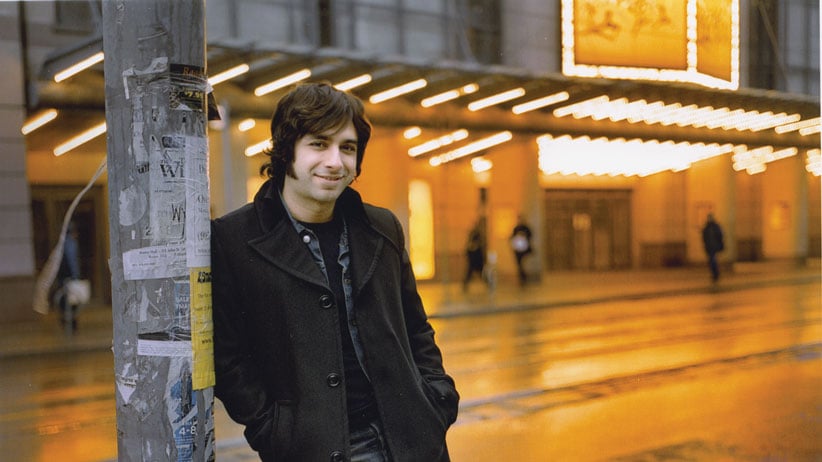
As the allegations unfurled with grisly details, a new chorus emerged, with those close to Ghomeshi coming forth to say, “We knew something was off,” or, at least, “We should have known.” Articles appeared in Slate and the Guardian, along with tweets such as this one by National Post cartoonist Steve Murray: “Every time a Jian profile is about to come out, I’m like ‘FINALLY,’ and then it’s a puff piece and I get so goddamned angry.” The behaviour they referenced was Ghomeshi’s reputation as a cringe-inducing pick-up artist with a fondness for much younger women. On Facebook, former Q producer Peter Mitton reported that he was initially thrilled at being hired in “the media big leagues,” but left due to a “gnawing sense that my labour was being misspent. It may have been in the service of creating entertaining radio, but that was increasingly secondary to the service of building up the host’s public persona,” he wrote, adding: “It’s deeply troubling to hear in detail how he allegedly leveraged that same public persona in the service of his own troubled private self.”
Now, the private Ghomeshi—the version given a free pass by his employer but well known within arts and media circles as “kind of dark with women,” as a friend of one of his accusers put it to her—was suddenly public. It was a case of everybody knew—except for the hundreds of thousands of listeners who started the day with his soothing voice, and who, understandably, trusted in the person presented to them by the CBC.
No one saw that disconnect more clearly than the dozen or so people who worked on Q. Although Ghomeshi was not the boss at the show, he was the “talent”—and the place operated as his fiefdom of sorts, a workplace with exacting standards and often cruel punishment for those who didn’t live up to them. “The culture was horrifying because of Jian,” says a former female producer. “He was a master of mind games,” says another former staffer. One day, Ghomeshi would be jovial and generous; the next, cold and dismissive. His chronic lateness kept staff on edge; he kept people waiting for hours. Everyone bridled—at least privately—at his mood swings and his penchant for playing staff against one another. The predominantly female staff found themselves reduced to tears by his tirades. The trauma and unhappiness within the unit was known within CBC, says a longtime CBC employee not associated with the show. And yet, CBC management never intervened. A producer who has alleged that Ghomeshi fondled her and told her he wanted to “hate-f–k” her reported she was told by the executive producer to try to work around it; Ghomeshi wasn’t going to change. This week, according to CBC News, two more women—one a former Q staffer, another a current CBC employee—alleged Ghomeshi was abusive and sexually aggressive. One was afraid to speak out. The other says she told a supervisor but nothing happened. Even when Ghomeshi reportedly went to the CBC this spring about a story in the works about his interest in “rough sex,” management simply took his word for it that it was consensual.
But if Q staff saw a pattern of manipulation, it’s easy to see why they didn’t challenge it. “Nothing in Jian’s world happened by accident until recently,” says a former staffer. Anyone who disagreed with Ghomeshi could be cut off, says one producer: “If he perceived intellectual disagreement of any kind, he would freeze you out for days or weeks, which would make it impossible to do your job.” People who dared to confront him about his bad behaviour would be targeted. Ghomeshi could get angry and was often petulant, especially when he felt slighted. Story pitches would be subject to extra scrutiny, tiny faults would become a pretext for rewriting an entire script, and he would stop responding to emails and phone messages. Some staff came to believe that Ghomeshi was subtly telegraphing on air who was in his bad books by refusing to use their nicknames, as he usually did, when he read out the show credits at the end of the week.
Ghomeshi also had a reputation for being thin-skinned: “He could have an auditorium full of people applauding him, but if he goes out into the hall and somebody says, ‘You suck,’ it eats him alive,” says Roberto Veri, who worked as a Q producer in the show’s early days. “He’s a narcissist, very self-involved.” One former CBC employee who issued a critical tweet about an episode of Q, years after she’d left the corporation, reports that she received an angry phone call from the host.
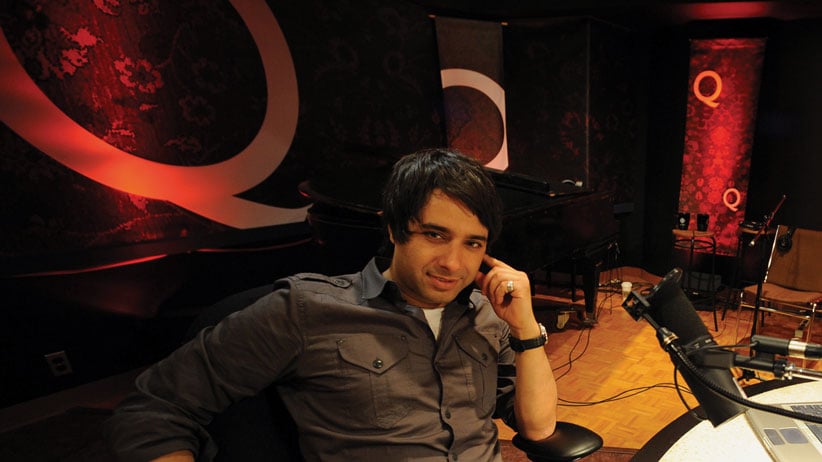
There were occasional attempts to deal through official channels. And there was a widely shared view that management were unwilling to, or simply incapable of reining in the man who had become the face of CBC Radio. One former Q staffer saw the problem as systemic: “This whole economy at CBC is screwed up, and this guy took advantage of it. People are on contract; they don’t have secure jobs, and even those who do are led to feel lucky they do.”
In time, the line between Ghomeshi’s public-broadcaster job and personal brand blurred. Q became Q with Jian Ghomeshi, and Ghomeshi became more and more the show. In 2010, he arranged it so that when he took summers off, the show’s name would revert to Q in the Summer. Staff who didn’t tweet about him being named one of Hello! magazine’s “Most Beautiful Stars” were admonished. He took note of staffers who didn’t attend his book launch. And he made full use of the connections he made via Q, says one producer. His second book, now cancelled, was said to be about anxiety. In Q interviews, he’d insert questions about success, anxiety, and how to deal with fame, which became regular themes on the show.
The platform the show had created for him—and his on-air persona as an impossibly sensitive, progressive feminist—helped to draw women to him. He often searched for messages about him posted by women on Twitter or Facebook and, if the women were attractive, alleges one former staffer, he’d contact them directly. “He was soliciting non-stop. It was his playground.”
There was even a degree of flirting with famous and attractive women on-air, says one producer. “I was always shocked that there were no complaining letters. I guess people saw that as a charming dynamic.” It was also not uncommon for Ghomeshi to ask guests for their email addresses. “But that’s all you’d see; you wouldn’t see what was next.”
Many of the allegations made against Ghomeshi are twinned to industry events burnishing the Ghomeshi brand—the Banff television festival in 2003, show tapings, music or CBC events, signings to promote his memoir, 1982. A CBC producer in Montreal with aspirations of working on Q met Ghomeshi at one of his book signings. He expressed interest, and she said she told him: “I want to work for you, not date you.” The woman, who still works in the media but not at CBC, chose not to complain. “I felt like Jian was CBC god,” she told the Toronto Star. She received an invitation to a job interview from Ghomeshi’s executive producer shortly thereafter. She was surprised to find Ghomeshi present at the interview. She didn’t get the job.
His ego often overshadowed the show. When Q scored the Canadian exclusive with WikiLeaks founder Julian Assange in September, Ghomeshi seemed slighted when Assange greeted him with, “Good to be with you, Q.” He interrupted the conversation to correct him: Thank you—oh, thank you for calling me Q. I’m Jian. But you can also call me the name of the show.”
Stories circulated at the CBC about his penchant for “rough sex,” but they were mostly dismissed as gossip, says Paul Malcolm, a Q producer for four years. “I heard rumours of punching for as long as I was on the show, but I didn’t believe it.” “Jian was very private,” says another producer, who noted he seemed to have different tiers of girlfriends. There were high-profile women with whom he was aligned —Ani DiFranco, Sarah Polley, Lisa Ray, Tessa Virtue—as well as far younger women, who would accompany him after show tapings in other cities. They were of a type, she says. “They were very beautiful, very young and pencil-thin—they’d look breakable.”
Ghomeshi was known for pushing his advantage with women. One woman who met him at a party and rebuked his advances said he responded by asking if her rejection was tied to the fact that he wasn’t a “perky-nosed Brad Pitt type.” “Everyone thought he was rather confused, sexually,” says one long-time CBC staffer. “I was at a party with good friends of his; I watched him zero in on young women. He should be embarrassed, but doesn’t seem to be.”
But several women who knew him socially say the allegations don’t match the man they knew. “My experience was inconsistent with the picture that’s being painted,” says one woman, who went out with Ghomeshi in the early 2000s. Videographer Isis Essery, who filmed Ghomeshi’s book launch, has known Ghomeshi for several years: “I really don’t have any insight into this side of him,” she said in an email. “I was in just as much shock as anyone else.”
Related:
The other problem with ‘Q’
Editorial: A national conversation about sexual assault has begun. Finally.
Is it any wonder we don’t report?
#YouCantShutMeUp: Feminism goes viral
‘Q’ executive producer on leave amid Ghomeshi scandal
Ghomeshi seemed to have few, if any close relationships, says a former CBC co-worker who recalls asking him if he had a best friend. The host paused for a few seconds and finally produced the name of Jack Ross, his former manager, then added, “and whomever I am dating.” That response struck the co-worker as both sad and telling. “His best friends are a guy he pays, and whatever young woman he’s going out with this week,” said the former employee. One woman who dated him is now trying to sell her story.
Ghomeshi would occasionally brag about his conquests when only men were present, providing graphic details; there was never a mention of violence. “All it served to do was verify my impression of him as a douchey guy,” says Malcolm. Veri, who left the show in 2009 after his contract was not renewed, says one of the executive producers once told him that a well-known Canadian actress had claimed that the Q host had tried to choke her during a sexual encounter, but he didn’t know whether to believe the tale. Veri also says he once witnessed Ghomeshi come up behind a female co-worker and grind his pelvis into her. But the woman—now one of the 11 who has come forward with allegations—did not complain at the time, and Veri, uncertain of the circumstances, never mentioned what he had seen.
Within Q, there’s now concern that the show’s profile as a forum for socially and politically relevant topics—rape culture, queer-positive stories, trans stories, anti-racist stories—provided cover: “Jian cultivated an identity of total progressiveness,” says a Q producer who is grappling with the allegations. “I found it really confusing at first, because, on one level, this is not the person I know. He’s someone I like a lot and care for—and all of those things make it incredibly hard. But, as it sunk in more and more, the scales are falling from my eyes. I’m seeing that some of the other behaviours that were well known—like what a narcissist he was and how toxic he could be in the workplace—are related to all of this. Now, women on the show are asking: How much were we being manipulated to prop up that identity to help protect him from this other side—and provide a gateway?” Yet this, too, was not a secret within the CBC. A woman who interned in 2009 recalls rumours of Ghomeshi’s “inappropriate behaviour” while there, but saw no sign of it. Toward the end of her time there, a senior female producer took her aside to ask if Ghomeshi had made any inappropriate comments or had asked her out.
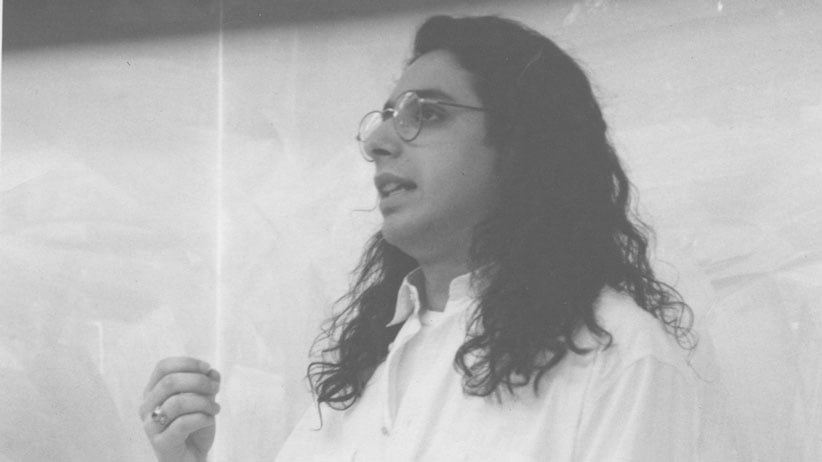
Ghomeshi’s ability to inspire near-messianic devotion to his politically progressive message—amid rumours and whisper campaigns—dates back decades, to his days at Toronto’s York University, where he began as a theatre major in 1985 and graduated with a degree in political science in 1995, with time out to tour with Moxy Früvous. In 1989, when he still went by Jean Ghomeshi, he staged a bold, but unsuccessful, coup to overthrow the student government. “It was like he was the Messiah,” says Peter Merrick, who sat on council at the time. “He came in with that flowing hair and people who supported him.” Ghomeshi spoke for those beyond the then-conservative student-council orbit: He wanted to bring more women, minorities and queer students, and their concerns, into student government. “It was like he was their saviour,” says Merrick. “He played right into that. He had this persona and supported all the right things; he took control of the narrative.”
The following year, Ghomeshi was elected president of the Council of the York Federation of Students with a record-breaking number of votes (he changed its name to the York Federation of Students, or YFS). His followers were known as “Ghomeshi-ites,” Merrick says. “He had this following of women, specifically; they were sort of enamoured with him. He had a rock-star persona.”
At York, Ghomeshi “wanted to be the champion of women’s issues,” says Mitch Blass, a council vice-president. Ghomeshi’s election promises included increasing funding to the Women’s Centre. He spoke out in support of increased safety measures for women on campus, and co-founded a pro-choice network. Under him, YFS boycotted and published names of companies that have “ties to, or engage in racist, sexist, or homophobic activities.”
But then, as in more recent years, it could be hard to separate the politics from personal, less ennobled ambition. Ghomeshi could be a “shameless self-promoter,” says Chris Lawson, who was on staff with the Ontario Federation of Students during Ghomeshi’s presidency, and is now a communications officer with the Public Service Alliance of Canada. He recalls the student leader being front and centre among York students at a Queen’s Park rally for abortion funding: “Here’s this dude, carrying the banner, which, to a lot of people, was an act of ultimate hubris. I think most men who support women and support women’s rights wouldn’t want to take up all that space at the head of a parade about abortion. They would see their role as being supportive.”
Lawson also calls Ghomeshi a “saviour” figure, “in the sense that he was a president of [a student council] that had hitherto been a real political wasteland. And here he was, bringing them into the student federation. He was charismatic, he was good-looking, he played guitar, he could sing, he was this perfect kind of renaissance man, with great politics, to boot.”
Word around campus was that Ghomeshi used feminist lingo and his progressive credentials to get women into bed, says Lawson: “We used to treat it like a joke, in the sense that he was so blatant about it.” Men saw Ghomeshi as a “douchebag” with an incredible ego, says a male student who knew him at the time: “Maybe we despised him because he figured out how to use feminism to f–k women. It was obvious to many of us that he was strategically using that kind of sensitive, new-age guy, feminist guy. He was playing the role. He really, really needed a lot of attention.”
Student politics can be vicious, and some of his critics joked about creating a mock poster featuring a photograph of Ghomeshi hugging a woman with a smile on his face, Lawson recalls: “The wording on it was going to be, ‘Ever think about sleeping with men?’ ” And at the bottom, it was going to say: ‘Think again.’ ”
A woman who sat with him on the federation says he’d only talk to women in his office behind closed doors, even though that was against university policy. There was subterranean disenchantment, says Lawson, who says, “The shine started to come off of him. He was starting to lose fans among the groups that had got him elected. He was the figurehead, and they had done all the work.” But, years before his rise as a feminist hero, he had a reputation as a male feminist pig, at least according to Kerry Eady, who attended York in 1988-89 and lived in Stong residence. Eady recalls attending a meeting with 25 other women convened by female residence advisers at Stong before Christmas 1988 to warn them, after a few women had reported having “bad dates” with Ghomeshi. Those allegations involving hitting; one women claimed she’d been choked in the stairwell. In echoes of responses to alleged harassment at the CBC 25 years later, the York women were told to be vigilant—and to work around him, Eady told Maclean’s. “We were told to report his presence in co-ed floors or at house parties, so residence advisers could escort him out. He was considered a creep.” Maclean’s was unable to find others to corroborate the story at press time, though Merrick noted that rumours abounded that Ghomeshi could be “emotionally abusive with women.”
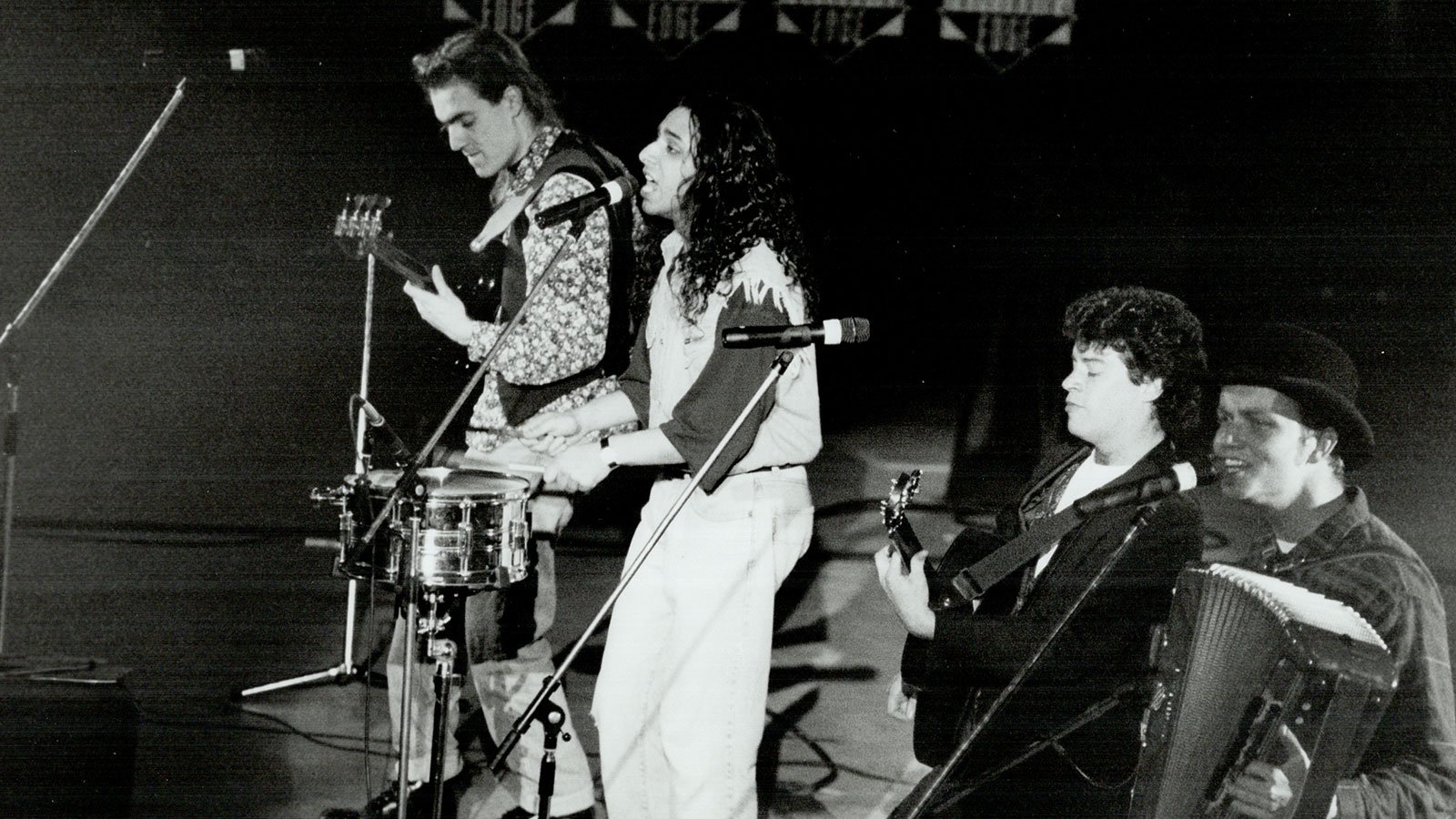
Ghomeshi’s natural inclination to the spotlight—for someone who’d always identified as an outsider, he had an uncanny way of gravitating to the centre of things—also found expression in Moxy Früvous, the band he co-founded in 1990 and which became known for its antic theatrics, social satire and progressive audience. Its 1992 video for King of Spain, its first hit, was graced with cameos by Jack Layton, Olivia Chow, Daniel Richler, Cynthia Dale and Sarah Polley. There was no one front man, but when the band was interviewed by the Wall Street Journal and People, Ghomeshi was the one quoted. In 2000, The National ran a short item about a song he’d written commemorating Pierre Trudeau, prime minister when his parents emigrated from England. A staffer was struck by Ghomeshi’s desire for the spotlight: “When I met him, I thought, ‘Man, this guy wants to be on CBC so bad, I can taste it.’ ”
In 2002, when Newsworld, the CBC’s cable news channel, was scrambling for a host for a new live, late-night pop-culture show, Play, Ghomeshi auditioned. The show, targeted to an under-40 audience, was part of the network’s ongoing “hip replacement” campaign, as one staffer puts it, to shed its highfalutin, fusty image. Ghomeshi’s personality, not his audition, won him the job, says a former Play staffer: “It was his charm, it was the way he spoke to the producers.” Staff were skeptical; Ghomeshi’s hosting experience was limited, he had no journalistic experience and he needed training in how to read a script, he says. A Globe and Mail reviewer was not impressed by his debut: “Ghomeshi is a breath of fresh air and he can be funny, but, in a rough tape sent for review, he displayed an odd habit: During an interview, he’d turn and mug for the camera. I’m all for lightening up things at the CBC, but this is just irritating, not to mention rude.”
The program quickly became the “Jian Ghomeshi show,” says the staffer. “He knew how to sell a crowd; that was his stage persona.” Former “Frü-heads,” as Moxy Früvous groupies were known, were busing in to see him, the staffer recalls: “After the show, he wasn’t there to socialize with the team; he was there for the fans. He’d always leave the show with someone who showed up.” Eyes would roll, but no one said anything, the staffer said. “We didn’t want to be judgmental. There was nothing illegal going on. Still, you’d think a 37-year-old man shouldn’t be hitting on 22-year-old women.”
Play’s predominately female staff joked about being part of “Jian’s harem.” He could be inappropriately “touchy-feely,” offering women back rubs, his former colleague says. Men on the show could not stand him, the staffer says. “There was something about him; he didn’t make eye contact with men.” Offstage, Ghomeshi was known as insecure, even paranoid, often storming out of meetings at any criticism. When the show filmed a cinéma vérité-style “day in the life of Play,” footage showed Ghomeshi in an unflattering light (“It was him being him,” the staffer says). He brought in his agent to stop it from airing; an edited, sanitized version was presented for public viewing.
But Ghomeshi prevailed by knowing what the Mother Corp. wanted to hear: “We’re trying to be a smart and critical show without being highbrow,” he told the Toronto Sun in 2002, adding, “I see myself as the new, brown Tommy Hunter.” The end of Play in 2005 due to poor ratings was not the end of Ghomeshi: He continued to be a regular contributor to arts and culture segments on The Hour and was handed other assignments. Ghomeshi knew how to appeal to CBC suits: “He told me he wanted to be his generation’s Peter Gzowski,” Chris Boyce, then head of program development (now executive director) at CBC Radio, told Toronto Life in 2013. Ghomeshi told him: “Okay, this is where I want to be, and I want you to tell me what I need to do to get there,” he said. He was given test runs hosting a panel-driven music series and, later, an 11-week gig filling in for Shelagh Rogers on Sounds Like Canada, which occupied the prime 10-11:30 a.m. time slot once held by Gzowski’s Morningside. Ghomeshi shook up the format, playing Radiohead and introducing more pop-culture coverage. Producers and long-time listeners were disgruntled; Boyce was thrilled.
Ghomeshi’s quest for the spotlight dovetailed with a seismic shift within a public broadcaster. In the mid-aughts, the network launched a study to find out how to resuscitate its audience: The over-55 crowd was dying out and not being replaced. Traditional public-radio ideals of the public trust, and it being a privilege to host a program, were being replaced by private broadcasting mantras, says a former CBC host and producer. “There was this weird crossover idea around popularity and accessibility, and this anti-intellectual thing began sweeping through—the sense that CBC is snobby and elitist and we have to change that. Stodgy old hosts and British accents were bad news.”
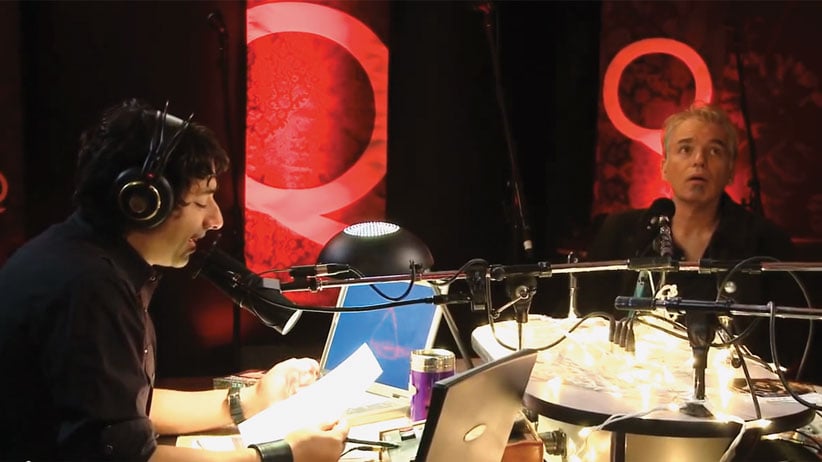
Veteran broadcast executive Richard Stursberg arrived in 2004 and filled the schedule with share-boosting shows such as Dragons’ Den, Battle of the Blades and Wheel of Fortune. Hosts from “planet TV,” such as George Stromboulopoulos and Ghomeshi, were groomed for stardom, a former staffer says. “It was very [Marshall] McLuhan-esque: The medium is the message. But these guys are the message themselves; it’s all about them.”
Stursberg, too, was a Ghomeshi fan, gushing in his 2012 memoir Tower of Babble that the host was “so clever, so charming and so driven.” Q began airing in March 2007 at 2:00 p.m. Ghomeshi lobbied hard for the prized former Morningside slot, Stursberg writes. “ ‘Put me in. We’ll move the numbers,’ [Ghomeshi] promised.” In June 2008, Ghomeshi got his wish. The move was meant to telegraph a major shift in direction, Stursberg writes: “It would indicate that we were pursuing a more urban and more contemporary feel, along with a younger demographic.”
It’s a formula that worked. As many as 811,000 tune into Q during an average weekday, and 6.9 million listeners tuned in at some point during the 2013 and 2014 season. That’s fewer daily listeners than The Current boasts, but Q is also syndicated in 160 stations in the U.S. on Public Radio International. Julia Yager, PRI’s senior vice-president for sales and marketing, says the number of Americans listening to Q on a weekly basis was 858,000 in spring 2014, up six per cent from last fall. Q is “one of the faster-growing public radio programs in the U.S.,” she says. A weekly televised version of the show draws 300,000 viewers, the Q YouTube channel averages 1.5 million hits per month, and the podcast gets about 250,000 downloads every week.
On the broader stage, too, the CBC’s investment in Ghomeshi—he’s reported to make just shy of $500,000 annually—paid off. In 2012, there was much celebration when Ghomeshi was named best talk-show host at the New York Festivals International Radio Awards. A former CBC employee sees Ghomeshi’s appeal to the CBC as a “projection screen for a lot of CBC insecurities. There was this idea of the non-existent Canadian star system, and we need somebody to participate in all of the s–ty galas we have. And Michael Enright might not be that guy.”
“It was a complicit relationship,” says a former CBC producer. “It wasn’t as if Jian arrived fully formed as their dream. He made sure he appealed to them, too, which is how he made the leap from a Newsworld show, which used to be the place [where] the smart people played.”
The medium worked for him, says a long-time CBC staffer. “On television, there was something about him that radio doesn’t have. He has that voice. On TV, he’s awkward.” Radio allowed Ghomeshi a tool of seduction, says a CBC host. “It’s incredibly intimate. It’s like a needle mainlining through a main vein. You invite people into your house, your car, your bedroom.” Ghomeshi consciously mirrored guests’ tone and cadence to create the illusion of intimacy, he told Toronto Life in 2013: “People connect with people who sound like them,” he said, “not to be too Machiavellian.”
Such was the sway of a man who referred to himself as the “Persian Prince” on Twitter that management sided with his version of events for months—until Ghomeshi himself served up graphic evidence that he had “injured a woman,” as executive vice-president Heather Conway wrote in an internal CBC memo the week after he was fired. “We also spoke to Jian at that time, and asked him directly if there was any truth to the allegations,” she wrote. “Based on Jian’s denial, we continued to believe Jian.”
Now, the network that believed and gave Ghomeshi a public platform is forced to look at what was lurking in plain sight. “It’s not simply the fact that it’s a show branded and sold with his image, but also that the CBC represents public trust,” says a former Q staffer. “Even if you don’t agree with the existence of a public broadcaster, the CBC belongs to everyone; it’s a public trust. What’s so tragic about this, is that has to exist in good faith, and partners have to exist in good faith to have that a living thing. That’s something that was abused. To think that it may have feathered his nest—that is such a monstrous story.”
It’s a story that’s far from over. Ghomeshi, who has gone underground, was reported to be in Los Angeles, then Ontario’s Muskoka region. He has said he plans to address the allegations, but has not yet done so. (Maclean’s requests for an interview were not answered.) Before any charges have been laid, the organizations that depended on Ghomeshi’s marquee value and showman skills have all distanced themselves. The Giller prize replaced him as its gala host; the Polaris Music Prize dropped him as a juror. Penguin Random House cancelled his second book—and told booksellers it had ceased further production of 1982. Valerie Poxleitner, the 27-year-old Toronto electropop musician known as Lights, had initially defended Ghomeshi, her manager for the past 12 years; this week, she posted a message on her Facebook page saying she had severed their business ties. “I am now aware that my comments appear insensitive to those impacted, and for that I am deeply sorry,” she wrote. “I hope everyone can heal from this.” Former Q guests—among them Atwood and musician Owen Pallett—added their names to petitions decrying violence against women. People who profited directly have also disassociated themselves. Speakers’ bureaus severed ties. So did Ghomeshi’s long-time manager and publicist. And in what is seen as an unprecedented move, Navigator, known for helping politicians and celebrities out of ignoble scrapes, dropped Ghomeshi as a client, suggesting worse to come. Based on what we’re finally seeing, that’s inevitable.
—with Jonathon Gatehouse, Michael Friscolanti, Genna Buck, Rachel Browne and Martin Patriquin
